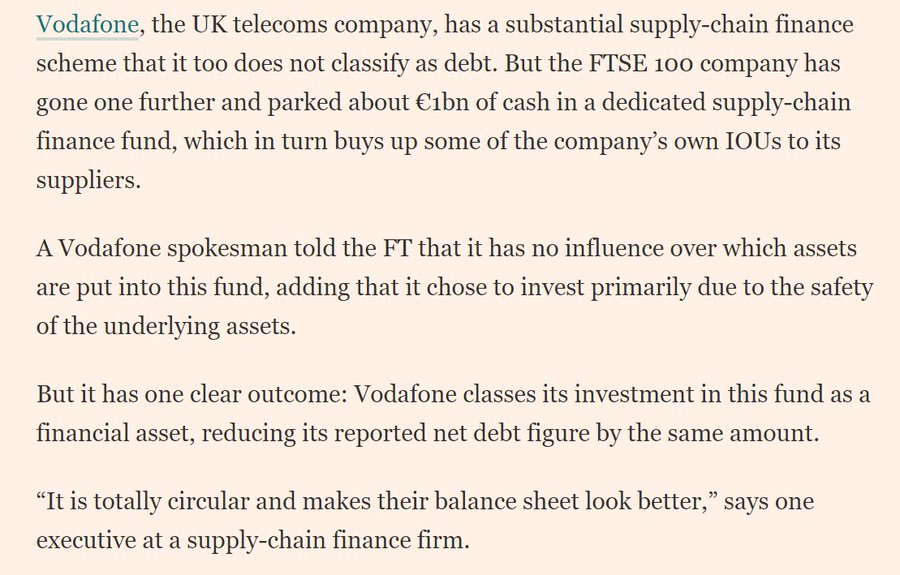Just imagine for a second that you're the treasurer or CFO of a mid-sized corporation, and your looking for somewhere to park money where you can earn a decent return without taking too much risk. One of the Credit Suisse corporate bankers comes to you one day with an idea. They call it "supply-chain financing".
The new strategy is essentially just another tool to help companies more "flexibility" in managing their short-term financing needs. It's a fool-proof idea, the banker explains, because even if the companies default, there are all kinds of insurance policies and other safeguards in place to help make the lenders whole. You're a
So you invest. A few years later, your banker calls with some bad news. Four of the 10 companies to which the fund was most heavily exposed imploded, and are likely headed for liquidation. It could be years before the lenders are made whole - if ever - and you and your fellow unlucky investors are simply along for the ride, but you can probably kiss that money goodbye.
Several months later, you open the FT, only to discover that many of the other investors in the fund, as well as the advisor managing the fund, were all financially linked to the companies in which the fund was investing. The circular flow of money from the funds to the companies' suppliers means that, for these other investors, any losses stemming from loan defaults have already been offset, since they're basically paying themselves...with your money.
Well, that appears to be what happened to some investors who weren't too happy when they found out that several Credit Suisse 'supply chain finance' funds were essentially part of an elaborate shell game orchestrated by SoftBank to help inflate the value of Vision Fund portfolio companies by making them look more financially healthy than they actually were.
Here's more from the FT:
SoftBank has quietly poured more than $500m into Credit Suisse investment funds that in turn made big bets on the debt of struggling start-ups backed by the Japanese technology conglomerate’s Vision Fund. SoftBank made the investment into the Swiss bank’s $7.5bn range of supply-chain finance funds, said three people familiar with the matter. Credit Suisse touts these funds to professional investors, such as corporate treasurers, as a safe place to park their cash in the short-term debts of seemingly diversified companies. Marketing documents sent to investors show that these funds have ramped up their exposure to several start-ups in the Japanese group’s $100bn Vision Fund over the past year. This has coincided with a disastrous stretch in which $18bn was wiped off the equity value of these technology bets. At the centre of the circular flow of funding is Greensill Capital, a Vision Fund-backed company that says it is “making finance fairer”. The London-based firm, which employs former British prime minister David Cameron as an adviser, selects all of the assets that go into the Credit Suisse funds under an agreement dating back to 2017.
SoftBank effectively used these Credit Suisse funds - which were administered by Greensill Capital, an investment firm that, bizarrely, received a $1.5 billion slug of cash from VF. Aside from being run by an Aussie "paper billionaire" and advised by former Tory PM David Cameron, it's not clear exactly what Greensill is supposed to be doing with all that money. But the company has managed to find itself enmeshed in all sorts of skullduggery uncovered by the intrepid reporters at the FT.
Fun story last night with @ArashMassoudi: SoftBank has quietly put than $500m into Credit Suisse funds that heavily finance struggling Vision Fund start-ups.
Starring Greensill Capital, a Vision Fund-backed company advised by David Cameronft.com/content/6995af…
28 people are talking about this
The whole scheme hinges on supply-chain finance, an esoteric financing technique at the centre of the collapses of NMC Health and Carillion.
If you're new to this, I explained how it works on today's FT News Briefing podcast.podcasts.apple.com/gb/podcast/sof…
See Robert Smith's other Tweets
The most prominent proponent of the financing technique is Lex Greensill's eponymous firm Greensill Capital, backed by the SoftBank Vision Fund
Greensill selects all of the assets that go into the Credit Suisse funds, which we delved into last month ft.com/content/d5a595…
See Robert Smith's other Tweets
If the circular financing flow sounds familiar, that's because Greensill has been in the middle of a similar arrangement involving Vodafone and another Swiss fund manager (GAM)
Story on that from @TBeardsworth: bloomberg.com/news/articles/…
And column from me: ft.com/content/1ad798…
See Robert Smith's other Tweets
Greensill Capital is absolutely central to the complicated financing techniques underpinning the industrial and commodity trading empire of Sanjeev Gupta. Deep dive on all that from @Michael_Pooler and me:ft.com/content/5f2796…
See Robert Smith's other Tweets
The guys over at @trashfuturepod (@raaleh @milo_edwards, @hkesvani, @inthesedeserts, @aliceavizandum) did a whole episode on Greensill Capital on their Patreon recently, explaining it in a much more hilarious way than I'm capable oftrashfuturepodcast.podbean.com/e/preview-divi…
See Robert Smith's other Tweets
Four of the CS's supply chain finance funds' top investments were tied to Vision Fund portfolio companies.
Marketing documents for Credit Suisse’s main supply-chain finance fund show that, at the end of March, four of its top 10 largest exposures were to Vision Fund companies, accounting for 15 per cent of its $5.2bn assets. This included companies hit hard in the coronavirus crisis, such as Indian hotel business Oyo and struggling car subscription start-up Fair. A separate document shows that Santa Monica-based Fair was also the second-largest exposure in Credit Suisse’s “high income” supply-chain finance fund at the end of last year. In October, the car subscription company’s founder and chief executive resigned shortly after announcing plans to cut 40 per cent of its workforce. Audited accounts for both funds show they had no exposure to Fair at the end of that month, suggesting that they only began financing the company after its difficulties came to the fore.
As the FT explains, investors (well, the investors who aren't SoftBank) have pulled $1.5 billion from the Greensill-managed Credit Suisse funds as several of Greensill's investments went sideways. Another interesting thing about Greensill: former British PM David Cameron is a paid advisor.
But now, the firm has hit upon a new strategy that just might revive the sagging fortunes of the SoftBank-backed lender.
Clients have withdrawn more than $1.5bn from these supply-chain finance funds this year, after a string of Greensill Capital’s clients defaulted on their debts in high-profile corporate collapses and accounting scandals, such as former FTSE 100 company NMC Health. Credit Suisse has told investors that a group of insurers and Greensill itself are covering losses in the funds. Australian financier Lex Greensill founded the company in 2011 and cemented his status as a paper billionaire last year when SoftBank’s Vision Fund invested $1.5bn into his eponymous firm. Greensill Capital specialises in supply-chain finance, where businesses borrow money to pay their suppliers. This week the British Business Bank approved Greensill to provide so-called “invoice finance” through the UK’s Coronavirus Large Business Interruption Loan scheme. “Making sure capital reaches the real economy, where it is needed most, is integral to Britain’s broader economic recovery,” Mr Greensill said of the decision.
There's nothing like extracting rents from government capital intended for the "real economy" to help keep a small, politically connected lender afloat.








